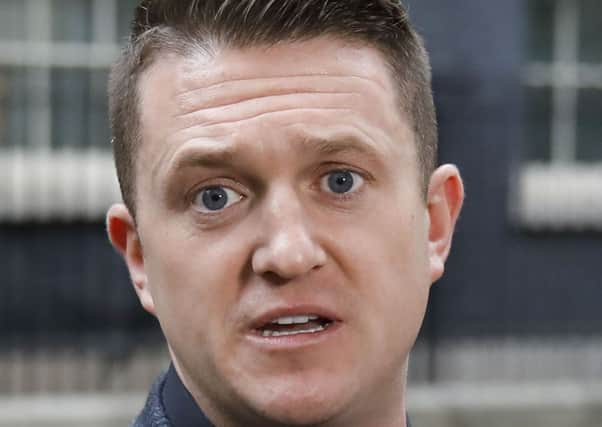‘Behead the political class’: Ukip and Tommy Robinson prepare for Euro elections – Paris Gourtsoyannis


Amid all the extraordinary events in parliament – I write that minutes after a leak has closed the House of Commons for the day, and in the same week as a dozen naked protesters pressed themselves against the glass of the public gallery – a chilling statement by an MP failed to get the attention it deserved.
Squeezed out by cross-party Brexit talks between the two main parties in the morning, PMQs at lunchtime, and the shotgun passage of legislation to delay the UK’s exit that evening, on Wednesday the Labour MP Rosie Cooper addressed her colleagues in the chamber.
Advertisement
Hide AdAdvertisement
Hide Ad“I was to be murdered to send a message to the state, and to send a message to this place,” she told them.
“Members of this House are regularly abused and attacked. Our freedoms, our way of life, our democracy is under threat, and we must do our utmost to defend it.”
Cooper, the MP for West Lancashire, was targeted by Jack Renshaw, who last year admitted plotting to kill her and threatening to kill a police officer who was investigating him for grooming a child for sex.
Renshaw will be sentenced on 17 May. His plot was only exposed when a whistleblower, Robbie Mullen, risked his life to come forward to the anti-racism charity, Hope Not Hate.
Two juries have been unable to reach a verdict on whether Renshaw remains a member of National Action, a banned neo-Nazi organisation, but it is clear his actions were inspired by a shared ideology. Hope not Hate chief executive Nick Lowles described National Action as an “extreme breed of neo-Nazis” that “vilified Jews” and “wanted to ignite a race war in Britain”.
What should make Cooper’s matter-of-fact statement that she was marked out for death even more shocking is that she isn’t the first MP to be targeted by the far right. Thankfully, this time they didn’t succeed.
It bears repeating again and again, even though it feels like the significance of that terrible moment has been forgotten: Jo Cox was murdered by a neo-Nazi shouting “Britain first”. One week ago, on what should have been Brexit day, parliamentary staff were advised to go home early as protest rallies addressed by Stephen Yaxley-Lennon – aka ‘Tommy Robinson’ – grew outside Westminster. I left work as night fell, and at that point, things remained calm.
But the language was already full of violence: the leader of UKIP said it was time to “behead the political class”, and a French journalist spoke to what looked like an average, middle-class English family of two generations, who reportedly told him London’s Muslim mayor should be “hung, drawn and quartered”.
Advertisement
Hide AdAdvertisement
Hide AdAfter dark, things got really nasty: there were clashes with police, fellow journalists were threatened and abused, and effigies of Theresa May and Sadiq Khan were dragged along the street, their heads in a noose. This was all outside parliament, where shouts of “traitor” are barely remarked on anymore.
This isn’t a general observation of where opinion is in the UK – I noted a fortnight ago how negative attitudes towards immigration have steadily declined – but it does reflect just how far the extremes of debate have disappeared into the distance.
With Brexit already delayed, and likely to be postponed much further in the coming weeks, the betrayal narrative has all the fuel it needs.
With awful timing, those forces have the perfect opportunity to express themselves. If European elections do take place in May, then a Ukip that has swung so far to the extreme, islamophobic right that most of its own MEPs and former leaders have quit will get an unexpected moment in the spotlight.
Just as when the BNP elected two MEPs, that’s the price of proportional representation.
How will a weakened political centre react when one of the UK’s last acts in Europe will be to send Tommy Robinson to Brussels? Or any of the people who share his views?
What kind of political platform and legitimacy will that give them? The biggest challenge to unity in the UK could still be to come.
